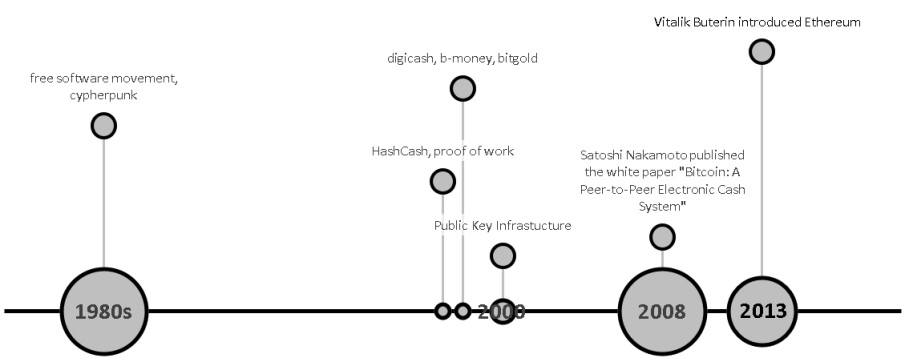Blockchain
Position on Blockchain:
On a philosophical level, Blockchain is an attempt to define the truth and have consensus in a society. The first consensus model was the 51% rule, having the majority of those who work agree on the truth definition. This is the Bitcoin model ( Proof of Work), then new models emerged to address different needs including giving power to those who have more stake ( Proof of Stake), or those who have more knowledge ( Proof of authority).
Blockchain technology was introduced in 2008. It is the result of using the lessons learned from the Peer-to-Peer community and the public key infrastructure community. In 2013, smart contracts allowed the automation of business logic which enabled the creation of new business models and solve existing problems in multiple domains including transaction reconciliation, patient medical records consolidation and food supply to state a few.

For investors in Blockchain related companies, there are three important factors that will signal a successful funding round for technologies that uses blockchain using initial coin offering (ICO), an equivalent to initial public offering (IPO) , first a pre-ico round, second, when the previous month’s total amount raised by the aggregate ICO market is higher, the amount raised by the next ICO is higher, and third, when an ICO has more connections to the popular social media websites, the amount raised by the ICO is higher.
Bitcoin pricing is dependent on speculation, without an underlying economy in contrast with the US dollar, which has an underlying economy, hence fluctuation will be higher in Bitcoin in contrast with the US dollar.
Blockchain is here to stay. It provides new tools that allows for new business models to solve existing problems. It allows for a new information flow that solves existing information silos problems. I think it will be a part of the monetary offering solutions worldwide in our lifetime.
Ahmed Gomaa
https://www.scranton.edu/faculty/gomaa/
References
Ahmed Gomaa, Salem Boumediene, Mohamed Gomaa, Magdy Farag. The Creation of One Truth: Single-Ledger Entries for Multiple Stakeholders Using Blockchain Technology to Address the Reconciliation Problem. Accepted with minor modifications. Journal of Emerging Technologies in Accounting (in print)
Ahmed Gomaa and Yibai Li. The Major Themes of the Initial Coin Offering (ICO) from 2016-2018 and a Five Layer Stack Model of the Market Landscape: A Latent Semantic Approach. Monograph: Enterprise in the Global Economy: Challenges of the Current Global Environment. ISBN 978-88-85813-77-9 (2020).
Satya Chattopadhyay, John Ruddy, Ahmed Gomaa. Enhancing Engagement and Business Continuity in an Entrepreneurship Program: A Blockchain Solution. Monograph: Enterprise in the Global Economy: Challenges of the Current Global Environment. ISBN 978-88-85813-77-9 (2020)
Ahmed Gomaa and Satya P. Chattopadhyay. Entrepreneurship Program on the Blockchain: An Experiment. Monograph: Enterprise in the Global Economy: Challenges of the Current Global Environment. ISBN 978-88-85813-77-9 (2020)
Ahmed Gomaa and Satya Prattipati. Use of Cryptos to Create Innovative Supply Chain Ecosystem: An Entrepreneurship Case. Operations Management Education Review. Vol(13) PP 97-122. (2019)
Ahmed Gomaa, Mohamed Gomaa, and Ashley Stampone. A Transaction on the Blockchain: An AIS Perspective, Intro Case to Explain Transactions on the ERP and the Role of the Internal and External Auditor. Journal of Emerging Technologies in Accounting. Vol (16) (1). PP 47-64. (2019)
Jinghan Cai and Ahmed Gomaa Initial Coin Offering to Finance Venture Capital: A Behavioral Perspective. The Journal of Private Equity.Vol (22)(3). PP 93-101. (2019)
Ahmed Gomaa, The Creation of a Cryptocurrency to Support Disintermediation. Operations Management Education Review Vol(12). PP 63-100. (2018).